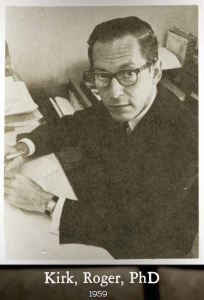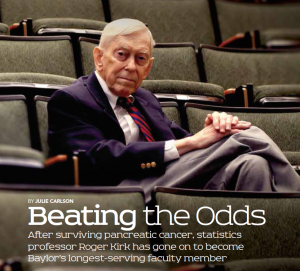By Julie Carlson
 When Dr. Roger Kirk began teaching at Baylor, Dwight Eisenhower was in the White House, NASA was brand-new and Toyota had just begun selling cars in the United States. Kirk, who serves as Distinguished Professor of Psychology and Statistics and Master Teacher, joined the Baylor faculty in 1958 –– and his 47 years of service have earned him the distinction of being the longest tenured faculty member in Baylor history.
When Dr. Roger Kirk began teaching at Baylor, Dwight Eisenhower was in the White House, NASA was brand-new and Toyota had just begun selling cars in the United States. Kirk, who serves as Distinguished Professor of Psychology and Statistics and Master Teacher, joined the Baylor faculty in 1958 –– and his 47 years of service have earned him the distinction of being the longest tenured faculty member in Baylor history.
“I am from Ohio originally, but I had friends who did business in Texas and I wanted to see the state,” Kirk said. “A job opened at Baylor, so I applied. I never intended to stay longer than a couple of years, but I fell in love with the University.”
Kirk earned bachelor’s and master’s degrees in music and a PhD in experimental psychology from Ohio State University. He began his career working for the Baldwin Piano and Organ Company in Cincinnati as a senior psychoacoustic engineer –– helping to improve the sound quality of the company’s instruments. But he soon fell in love with teaching while serving as an adjunct professor at the University of Kentucky before coming to Baylor.
“I have served with six Baylor presidents,” Kirk said. “When I first came to Baylor, the psychology department was housed in a former Air Force barracks building. I remember one time during class a student’s chair leg went through the floor. And now, we are in the marvelous (Baylor Sciences Building).”
In those early days at Baylor, Kirk was told that as a new faculty hire he was needed to teach statistics. That early assignment helped him find his calling. He went on to author textbooks on statistics and experimental design, which continue to be updated and are considered cutting-edge reference texts. In fact, his first book –– Experimental Design: Procedures for the Behavioral Sciences –– continues to be the most frequently cited book in its field.
In 1991, Kirk founded and served as the first director of Baylor’s Institute of Statistics, which eventually became the Department of Statistical Science. He is known for being innovative and creative when deriving new ways to analyze data, and is one of the few professors, at Baylor or elsewhere, to have published research over seven consecutive decades.
“Psychology is a science, and it is important to understand the role statistics plays in it,” he said.
Dr. Charles A. Weaver II, chair and professor of psychology and neuroscience at Baylor, took a statistics class from Kirk as an undergraduate in the 1980s.
 “I remember most clearly the patience with which Dr. Kirk dealt with the students who were clearly math-phobic and scared to death of statistics,” Weaver said. “He never proceeded without allowing ample time for questions, and always began the class by reviewing the material covered in the previous lecture. I also remember his ever-present smile and gentleness. He was able to command respect in the classroom without engendering fear, which is much, much harder to do than it sounds.”
“I remember most clearly the patience with which Dr. Kirk dealt with the students who were clearly math-phobic and scared to death of statistics,” Weaver said. “He never proceeded without allowing ample time for questions, and always began the class by reviewing the material covered in the previous lecture. I also remember his ever-present smile and gentleness. He was able to command respect in the classroom without engendering fear, which is much, much harder to do than it sounds.”
Kirk has seen a number of changes take place in the fields of psychology and neuropsychology over the decades. He said that in the 1960s, male students made up the majority of psychology majors, and they were interested in experimental psychology and industrial psychology. Today, approximately 80 percent of psychology majors are female and hope to work in clinical settings.
Class sizes have also changed. While in the 1960s and 1970s classes were never bigger than about 20 students, Kirk’s undergraduate statistics classes today might have as many as 100 students. And while class sizes have increased, Kirk believes that mathematical competence has declined among undergraduates because of deficiencies in high school instruction. To make sure they acquire the full set of skills needed to make statistical computations, a number of students take advantage of extra help offered at Baylor.
“I have students complete a math skills assessment at the beginning of the semester, and those needing additional instruction in algebra receive it,” Kirk said.
Kirk has received many accolades for his skills in the classroom. On the national level, the American Psychological Association chose him to receive the 2015 Charles L. Brewer Distinguished Teaching of Psychology Award.
“A number of Dr. Kirk’s former students and colleagues wrote letters in support of his nomination for the award,” Weaver said. “One theme that runs through these letters is Dr. Kirk’s humility, kindness and dedication. His genuine love of the field of statistics and the enthusiasm with which he approaches teaching creates an ideal atmosphere for learning. He is tireless is working with students –– they enter his class with utmost respect for his accomplishments, but leave with a genuine affection for him as well.”
In 1993, Baylor named Kirk a Master Teacher –– the highest permanent honor granted to its faculty members. In 2012 he was named Baylor’s Cornelia Marschall Smith Professor of the Year, an annual award presented to a faculty member who makes a superlative contribution to the learning environment.
“Dr. Kirk teaches each class as if it is the first class he has ever taught,” said Dr. Jaime Diaz-Granados, a former chair of Baylor’s psychology and neuroscience department who now is an academic administrator in Washington, D.C. “He teaches with such an enthusiasm that he wins over even his most reluctant students. Students who steadfastly maintain that they are ‘not good with math’ inevitably leave his class with a solid grounding in statistical theory and practice.”
Active in a number of professional organizations, Kirk is the 2005 recipient of the American Psychological Association’s Jacob Cohen Award for Distinguished Contributions to Teaching and Mentoring. He’s a Fellow of the American Psychological Association, and has the rare distinction of being a Fellow of five divisions within the APA.
Kirk serves as a Fellow of both the Association for Psychological Science and the American Educational Research Association. and is past president of the Society for Applied Multivariate Research and Division 5 of the American Psychological Association as well as the Southwestern Psychological Association.
 But Kirk hasn’t spent all his time in Waco teaching and researching. He met his wife Jane Abbott-Kirk, an associate professor of piano at Baylor, in the 1970s. The couple still celebrates special occasions at Waco’s Poppa Rollo’s Pizza, the site of their first date on Jan. 30, 1975. They also enjoy ballroom dancing and can be found dancing or competing at venues in Central Texas. The pair teaches ballroom dance as well, and Kirk has even been known to keep his students’ attention by executing some snazzy dance steps in class.
But Kirk hasn’t spent all his time in Waco teaching and researching. He met his wife Jane Abbott-Kirk, an associate professor of piano at Baylor, in the 1970s. The couple still celebrates special occasions at Waco’s Poppa Rollo’s Pizza, the site of their first date on Jan. 30, 1975. They also enjoy ballroom dancing and can be found dancing or competing at venues in Central Texas. The pair teaches ballroom dance as well, and Kirk has even been known to keep his students’ attention by executing some snazzy dance steps in class.
“Jane had never danced, but she is so musical that it wasn’t a difficult sell to get her to try it,” Kirk said.
In 2012, Kirk faced his toughest challenge when he was diagnosed with pancreatic cancer. He took a break from teaching as he underwent surgery and chemotherapy.
“I am optimistic about my health, and I feel very fortunate that my doctor caught the cancer early,” he said. “I was able to get the newest treatment at M.D. Anderson Cancer Center.”
Even though he’s set Baylor’s record for academic longevity, Kirk has no thought of retiring from either teaching or research.
“I work at being a good teacher, and I’m very fortunate that I love to teach. I also find research very satisfying and I have six articles in press currently. I’m lucky that Baylor lets me combine those two passions,” he said.
But Diaz-Granados thinks that Baylor and the students who have benefitted from Kirk’s wisdom are the lucky ones.
“To hear Roger talk about his work is to know that he loves what he does. After all these years, he still gets giddy when talking about his research and his teaching. His approach to his scholarly work and his teaching craft has been a source of inspiration and aspiration for all who have called him colleague and teacher,” Diaz-Granados said.
——————
The entire Spring 2015 issue of Baylor Arts & Sciences magazine is available online.
©2015 Baylor University


Marvelous article about a man who had an enormous impact on my life!
Ps A favorite memory/inspiration of mine I’d add (just 1 of many): Dr Kirk started each day (early) by going over basic mathematics – calculus etc- working/cycling thru entire texts and working all the problems – just to keep the basics what we these days call top of mind. I’ve always held onto that notion: don’t lose the basics!
Frank Wyman
Behavioral Statistics 1987